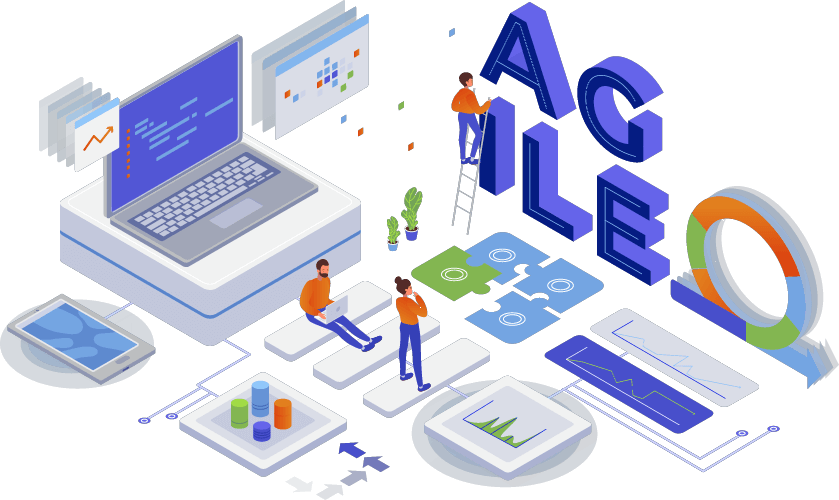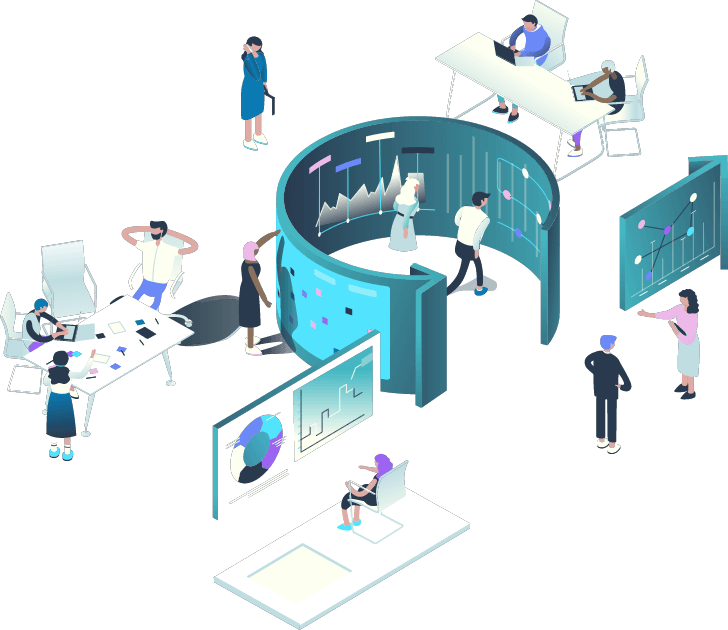Competition to attract customers and capture a higher market share is ever-increasing. This makes marketing one of the most important elements of a business’ overall plan. Agile marketing, one of the most popular marketing methods, is an iterative, incremental approach based on flexibility, transparency, quality and continuous improvement. Agile marketing principles help companies boost sales and build a stronger market presence.
An agile marketing team increases the quality of marketing work, boosts innovation, improves processes, works at a sustainable pace and increases return on investment. They help you get your campaign going! CAYK’s highly-skilled, experienced, agile, digital marketing team can help your business develop stronger digital marketing strategies. Our tightly-knit, knowledgeable, digital-first team is eager to help your business grow! Contact us today!


The agile marketing approach has been around for 20 to 25 years. It began in the software development field. In June 2012, a group of innovators developed a manifesto containing core values and principles. This document was an attempt to deal with the ever-shifting environment created by the advent of the world wide web. It provided guidance regarding swift and efficient execution and iteration in a volatile environment. From this initial approach, an agile marketing process has developed and refined, transforming marketing.
Agile marketing is an approach that aims at getting to market quickly. The focus is on frequent releases, deliberate experimentation, unrelenting commitment to audience satisfaction and promotion of business outcomes. Agile marketing strategies are about responding to change rather than following a static plan. You launch small so you can test, learn, and react, promoting the continuous and incremental improvement of results over time. Agile marketing solutions require a strategic vision as well as short, medium and long-term marketing plans. These techniques are best for complex projects with high uncertainty and changing requirements, such as website development. Using agile marketing services means:
CAYK’s agile marketing team uses iterations to refine an approach at each phase of a project, utilizing continuous feedback, strategic vision and medium and long-term marketing planning. Our tightly-knit, knowledgeable, digital-first marketing team is ready to help grow your business! Contact us today!
There are a number of significant differences between traditional marketing techniques and agile marketing strategies.
Traditional marketing focuses on KPIs (scope, schedule, budget, revenue growth, revenue per client, profit margin, client retention rate, etc.) Agile marketing principles focus on customer engagement and growth.
Traditional marketers connect specific initiatives to each campaign. Agile marketers use overriding themes to guide the actions taken to reach their target audience and achieve their marketing goals.
Traditional marketing approaches determine marketing requirements upfront while agile marketing services continually explore which channels/messages engage their target audience.
While traditional marketing involves a yearly plan committed to delivering campaigns/programs on a predetermined timeline, agile marketing services utilize quarterly, monthly and/or bi-weekly cycles, with the flexibility to adjust along the way.
Agile marketing services focus on responding to changing customer needs and shifting markets while the traditional approach involves set projects with a fixed schedule.
Agile marketing teams measure progress frequently and adapt plans to meet changing needs. Traditional marketing teams set a budget, estimate expected revenue, run the campaign and only then use the result to adapt the next campaign.
The main difference between agile and traditional marketing approaches is the planning and execution of campaigns. Agile marketing principles focus on the frequent delivery of content, experimentation and the use of data to inform continual adjustments. Traditional marketing focuses on initial planning and full execution of that plan, without changes. At CAYK, our agile marketing services help your business develop stronger digital marketing strategies.
Agile marketing provides increased speed in delivering value. Cross-functional teams finish projects autonomously with few handoffs between teams, allowing them to quickly cycle through work without stalling due to dependency on others. Customer feedback is quickly implemented.
Team members undertake the right work at the right time. Agile marketing teams work faster and execute more projects by removing unnecessary steps.
Agile marketing strategy involves continual experimentation and measurement of results (via relevant metrics) for the purpose of assessing success/failure and improving campaign efficiency.
Agile marketing creates visibility into the marketing team’s processes, workflow and performance, boosting collaboration. Communicating daily priorities, progress and issues during a daily standup enable the team to work together effectively and function as a unit. It promotes accountability and helps develop a shared understanding of current projects.
The flexibility of agile marketing is most apparent in the use of iterative planning to deliver results. Instead of blindly following an annual marketing plan, agile marketing teams quickly react to changing circumstances, expectations and market conditions. They define long-term goals but figure out the details along the way.
Agile marketing emphasizes experimentation, aligning marketing campaigns with data to measure success. The marketing team keeps tabs on task cycle time, efficiency rate and process throughput, ensuring the campaign moves at a sustainable pace. They run tests to prove/disprove assumptions, measure results and improve campaigns. Data-informed decisions are made about how, when and where campaigns enter the market.
Greater speed and continuous feedback allow agile marketing teams to adjust and adapt quickly rather than committing to long, inflexible campaigns. Consumer needs become the priority, allowing marketing teams to measure the impact of their campaigns as they occur. Data guarantees that the information gleaned is applied to the next project, keeping campaigns competitive and improving return on investment.
A shared vision/goal is utilized to break each campaign/project into smaller steps. Daily meetings keep the project organized and on track, improving the quality of collaboration and work completed.
An emphasis on repeated testing enables rapid discovery and insights through collected data. Acting on these results promotes the generation and implementation of innovative ideas that deliver results.
Agile marketing teams are focused on delivering what customers want. They take a flexible approach to their customers’ changing needs.
Frequent, consistent communication among all team members enables the rapid discovery of problems while a collaborative approach to problem-solving speeds up resolution.
Agile digital marketing teams are empowered by data and align their expectations throughout the organization, creating motivation and engagement of team members.
CAYK’s highly motivated, agile, marketing team provides these benefits and more! We aim for speed of delivery, increased productivity, transparency of process, collaboration and flexibility of planning. Our decisions are based on measurable data. We adapt and adjust quickly! Let us improve your marketing process with our agile marketing services. Contact us today!

Let CAYK’s highly-skilled, experienced agile digital marketing team help your company develop stronger digital marketing strategies. Contact us.
There are a number of key methods that agile marketing teams practice. Agile teams:

CAYK’s digital marketing agency implements the key techniques of the agile marketing process for the benefit of our clients. We use the agile marketing approach and structure to transform your campaign! Contact us.
The agile marketing approach involves:
Sprints are the amount of time (two to six weeks) that it takes to complete an ongoing project. Large campaigns may necessitate multiple sprints.
The marketing team assembles daily for a maximum of 15 to 20 minutes. Team members share what they completed the previous day and their plans for the present. Issues and problems are discussed and addressed.
Through the use of a whiteboard, sticky notes, a Kanban board and/or software, the progress of each sprint is tracked.
The success/failure of a sprint is the responsibility of all team members as teamwork is a fundamental element of agile marketing structure and principles.
The goals of each campaign are measured through the use of indicators. Decisions are data-driven and enable the team to test hypotheses.
Attempting too much at once compromises a team’s effectiveness and the successful completion of a campaign. Using agile marketing principles involves defining one or two priorities to focus on at one time, creating a sustainable pace.
Data is used to spark insights, find inspiration and create hypotheses. One or two hypotheses are then chosen for evaluation. The remaining ones are added to a list for possible future assessment.
Tests are undertaken to prove/disprove hypotheses, measure results and improve campaigns. Data-informed decisions are made about how, when and where campaigns enter the market.
Small experiments are undertaken frequently and the results are applied to the next cycle. This frequent iteration allows you to focus on responding to changing customer needs and shifting markets.
CAYK’s highly-motivated, agile, marketing team implements these techniques for each campaign. We strengthen your digital marketing strategies!
Are you unsure of your present marketing approach? Not getting the results you desire? Are your team members overwhelmed by their workload? Do you need more speed and agility? Agile marketing structure and methodology can be implemented into most business processes. It’s suited for companies where flexibility and adaptability are desired. Data-driven businesses that need to respond quickly to disruption, new trends, market changes and customer demands benefit from agile methodology.
Agile marketing is gaining momentum and popularity due to its flexibility, speed of production, process transparency and the increased competitiveness of campaigns. It allows for frequent campaign releases, increased experimentation and heightened customer focus. Once in place, it builds trust and loyalty between a digital marketing agency and its clients, promoting growth for both your company and your marketing team.
Interested in agile marketing principles and techniques? Want to work with a highly-skilled, experienced agile marketing team? Contact CAYK to learn more about our agile marketing services and how we can help your business develop stronger digital marketing strategies. Connect with our tightly-knit knowledgeable digital-first marketing team at (403) 456-0072 or request a marketing proposal.
"*" indicates required fields
Agile digital marketing focuses on flexibility, efficiency, and the iterative improvement of marketing strategies. By adopting this approach, businesses can quickly adapt to market changes, optimize their campaigns in real time, and ensure that their marketing efforts are always aligned with their current business objectives and customer needs, leading to improved ROI and customer engagement.
Agile marketing is characterized by its flexibility, responsiveness to change, and iterative approach. Unlike traditional marketing, which often follows a rigid, long-term plan, agile marketing adapts to changes in the market, customer behavior, or company goals, allowing for rapid response and continuous improvement.
Agile digital marketing enables businesses to swiftly adapt their strategies to the evolving digital landscape. This approach ensures marketing efforts are more aligned with current trends, customer needs, and technological advancements, leading to improved engagement and ROI.
An agile marketing agency may offer services such as real-time campaign adjustments, data-driven strategy development, cross-functional collaboration, and continuous performance analysis to ensure marketing efforts are effective and can quickly adapt to any market changes.
Agile marketing solutions offer greater flexibility, faster response to market trends, enhanced customer engagement, and continuous optimization of marketing strategies, leading to better performance and efficiency.
Integrating an agile marketing strategy involves adopting a flexible, customer-focused approach, encouraging collaboration across departments, using data to inform decisions, and continuously testing and refining marketing tactics to align with overall business goals.
Customer feedback is central to the agile marketing process, as it provides real-time insights into customer preferences and behaviors, allowing marketers to quickly adjust strategies to better meet customer needs and enhance satisfaction.
Challenges may include resistance to change, difficulty in cross-functional collaboration, and the need for a shift in mindset. Overcoming these challenges involves clear communication of the benefits, providing training, and fostering a culture of flexibility and innovation.
Agile marketing fosters innovation by encouraging experimentation, allowing for rapid testing of new ideas, and promoting a fail-fast, learn-fast culture that values creative solutions and out-of-the-box thinking.
Businesses should stay informed about advancements in marketing technologies, changes in consumer behavior, and the increasing importance of data analytics and personalization in agile marketing to maintain a competitive edge.
Agile digital marketing focuses on flexibility, efficiency, and the iterative improvement of marketing strategies. By adopting this approach, businesses can quickly adapt to market changes, optimize their campaigns in real time, and ensure that their marketing efforts are always aligned with their current business objectives and customer needs, leading to improved ROI and customer engagement.
Agile marketing is characterized by its flexibility, responsiveness to change, and iterative approach. Unlike traditional marketing, which often follows a rigid, long-term plan, agile marketing adapts to changes in the market, customer behavior, or company goals, allowing for rapid response and continuous improvement.
Agile digital marketing enables businesses to swiftly adapt their strategies to the evolving digital landscape. This approach ensures marketing efforts are more aligned with current trends, customer needs, and technological advancements, leading to improved engagement and ROI.
An agile marketing agency may offer services such as real-time campaign adjustments, data-driven strategy development, cross-functional collaboration, and continuous performance analysis to ensure marketing efforts are effective and can quickly adapt to any market changes.
Agile marketing solutions offer greater flexibility, faster response to market trends, enhanced customer engagement, and continuous optimization of marketing strategies, leading to better performance and efficiency.
Integrating an agile marketing strategy involves adopting a flexible, customer-focused approach, encouraging collaboration across departments, using data to inform decisions, and continuously testing and refining marketing tactics to align with overall business goals.
Customer feedback is central to the agile marketing process, as it provides real-time insights into customer preferences and behaviors, allowing marketers to quickly adjust strategies to better meet customer needs and enhance satisfaction.
Challenges may include resistance to change, difficulty in cross-functional collaboration, and the need for a shift in mindset. Overcoming these challenges involves clear communication of the benefits, providing training, and fostering a culture of flexibility and innovation.
Agile marketing fosters innovation by encouraging experimentation, allowing for rapid testing of new ideas, and promoting a fail-fast, learn-fast culture that values creative solutions and out-of-the-box thinking.
Businesses should stay informed about advancements in marketing technologies, changes in consumer behavior, and the increasing importance of data analytics and personalization in agile marketing to maintain a competitive edge.
Integrating an agile marketing strategy involves adopting a flexible, customer-focused approach, encouraging collaboration across departments, using data to inform decisions, and continuously testing and refining marketing tactics to align with overall business goals.
Customer feedback is central to the agile marketing process, as it provides real-time insights into customer preferences and behaviors, allowing marketers to quickly adjust strategies to better meet customer needs and enhance satisfaction.
Challenges may include resistance to change, difficulty in cross-functional collaboration, and the need for a shift in mindset. Overcoming these challenges involves clear communication of the benefits, providing training, and fostering a culture of flexibility and innovation.
Agile marketing fosters innovation by encouraging experimentation, allowing for rapid testing of new ideas, and promoting a fail-fast, learn-fast culture that values creative solutions and out-of-the-box thinking.
Businesses should stay informed about advancements in marketing technologies, changes in consumer behavior, and the increasing importance of data analytics and personalization in agile marketing to maintain a competitive edge.